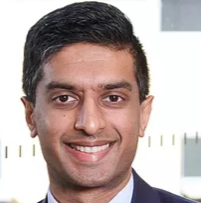If colonoscopies are recommended for routine colon cancer screening, why aren’t upper endoscopies advised for routine esophageal cancer screening?
An upper endoscopy can be performed right before a colonoscopy.
It seems that it’d be practical for gastroenterologists to perform these two procedures back to back, in the name of screening for two very deadly cancers.
Esophageal cancer has a five year overall survival rate of just under 20%.
Should you request a screening upper endoscopy even if you’re of average risk for this disease?
“Any time a screening procedure is being considered for cancer, the benefits in terms of lives saved needs to be weighed up against the risks involved with the screening procedure,” says Santosh Sanagapalli, MD, a consultant gastroenterologist, endoscopist and specialist in esophageal disorders.
“While upper GI endoscopy is certainly a low-risk procedure, it is not risk-free.
“Complications occur in one in 1,000 diagnostic upper endoscopies, and death has been reported to occur in one in 25,000 endoscopies.”
What are the risks?
• Tear in the GI tract
• Infection
• Bleeding
“We need to compare this level of risk to the benefit expected to be obtained from screening all patients (e.g., over the age of 50) routinely,” continues Dr. Sanagapalli.
“Based on current incidence rates in the U.S., over 20,000 screening upper GI endoscopies would need to be performed in order to detect one case of esophageal cancer.
“Not all of these would necessarily lead to a life saved, as not all diagnosed cancers are curable.
“Therefore, the expected benefits of general population screening for esophageal cancer are outweighed by the risks.
“By instead focusing screening endoscopy on those with a higher risk of esophageal cancer (e.g., those with established Barrett’s esophagus or multiple risk factors such as chronic reflux with age over 50, overweight or obese, smoking, male gender, Caucasian ethnicity), we can ensure that the benefits expected to be obtained from screening outweigh the risks.”
Why are colonoscopies a standard screening procedure?
Dr. Sanagapalli says that “population screening with colonoscopy is performed for colorectal cancer.
“However, colorectal cancer is far more common than esophageal cancer, and the risks of colonoscopy are comparable to upper endoscopy.
“Therefore, the risk/benefit ratio is in favor of screening.”
The estimated number of new cases of esophageal cancer in the U.S. for 2025 is 22,070.
For colorectal cancer it is 154,270.
 Dr. Sanagapalli is a gastroenterologist and director of the Esophageal Disorders Center at St Vincent’s Hospital, Darlinghurst. He performs diagnostic and therapeutic endoscopic procedures, and enjoys providing comprehensive and holistic care to patients with a wide variety of disorders affecting the gastrointestinal tract.
Dr. Sanagapalli is a gastroenterologist and director of the Esophageal Disorders Center at St Vincent’s Hospital, Darlinghurst. He performs diagnostic and therapeutic endoscopic procedures, and enjoys providing comprehensive and holistic care to patients with a wide variety of disorders affecting the gastrointestinal tract.
 Lorra Garrick has been covering medical, fitness and cybersecurity topics for many years, having written thousands of articles for print magazines and websites, including as a ghostwriter. She’s also a former ACE-certified personal trainer.
Lorra Garrick has been covering medical, fitness and cybersecurity topics for many years, having written thousands of articles for print magazines and websites, including as a ghostwriter. She’s also a former ACE-certified personal trainer.
.



























